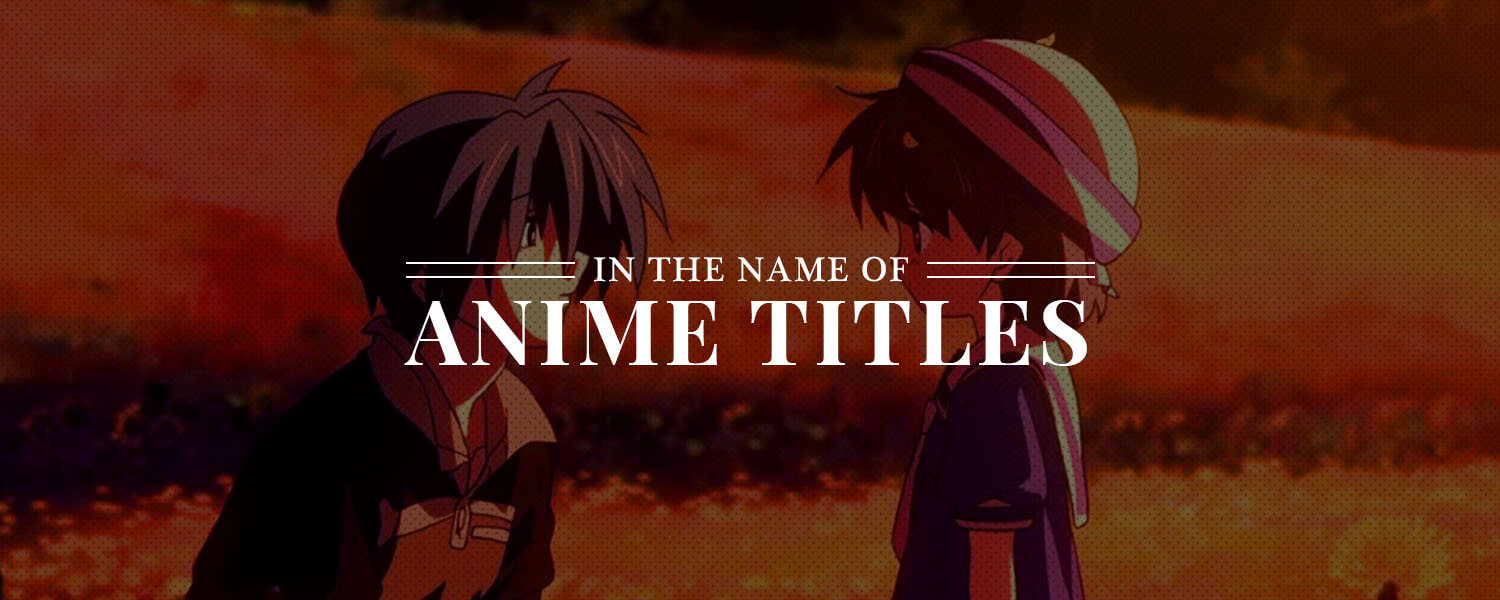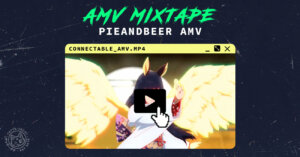I remember when I was first getting into anime I heard many people mention the title Clannad (2009). I didn’t know what the word meant at first, but because of that there was an immediate intrigue for me to find out. Now the word “clannad” actually means nothing. The creators of the visual novel took it from the name of an Irish band under the assumption that it was an old celtic word for “family”. However, the band itself derives its name from a condensing of “clann as dobhar”, which means something along the lines of “the family from Dore” or “those closely associated with Dore.”
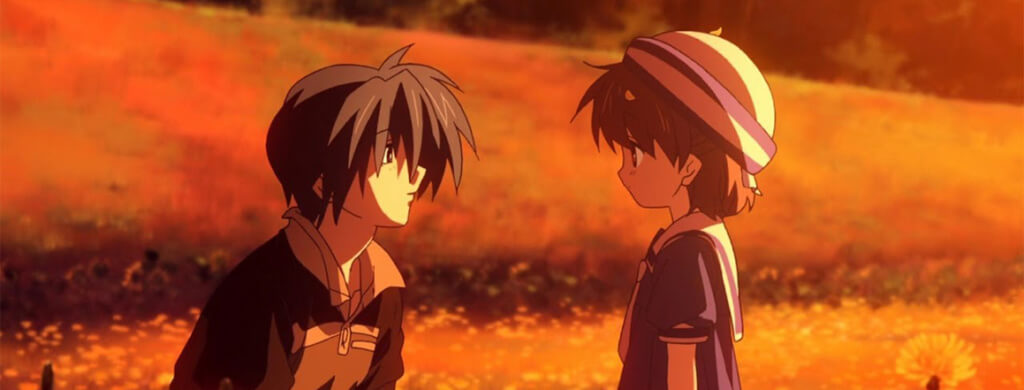
But it’s the thought that counts and I give kudos to the creators for at least trying to find a more distinctive name for their work. Imagine if Clannad was just titled The Family or Kazoku? What if Shirobako (2014) was called The Animators at Musashino? Religious Mecha instead of Neon Genesis Evangelion (1995)?
Anime Titles Are Like Business Cards
Good titles are something that can easily be taken for granted, even though in almost every case, the title is our first exposure to an anime. It’s not too hard to pick between Princess Tutu (2002) and The Ballet. In a way, the name of an anime, film, song or novel is its own business card. A good title is one that sparks interest upon hearing it, and a great title refers to the work with either emotional resonance or symbolic meaning.
Short and Sweet…
It’s also ideal to keep the title short and to the point. Having people always say “I’m going to watch Is It Wrong to Pick Up a Girl in a Dungeon (Danjon ni Deai o Motomeru no wa Machigatteiru Darō ka?) (2015)” is not very pragmatic. Sure, maybe it literally iterates to something that happens in the show, but it’s not a good name to get the word out. In fact, it’s such a chore to say, everyone just calls it by the contraction “DanMachi”. If the audience is forced to shorten the name of an anime for the sake of their own sanity, it’s probably better to think up a shorter title. How many people ever refer to Love Live with its full title Love Live School Idol Project (2012)?
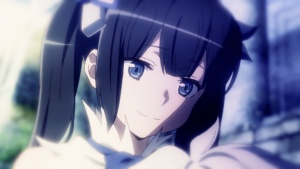
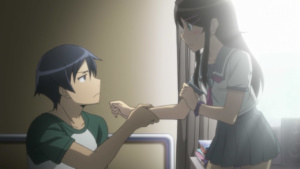
There’s always exceptions to this case. My Little Sister Can’t Be This Cute (Ore no Imouto ga Konnani Wake ga Nai) (2010) has a ring to it that really shines on the odd and shameless charm of the show. It gets to the meat of the story in a very clear manner and is surprisingly easy to remember. People have definitely used this full title much more than DanMachi’s, but even this has it’s own contraction, “Oreimo.”
I believe this is where the difference between a good and bad title lies, and I’ve outlined each point that will hopefully make it more transparent.
How Does the Title Refer to the Show?
Most titles are meta of their work in one way or another. It’d be weird for a show about Gundams to be called Megumi and the Giant Cherry Tree, though it would certainly get people’s attention. A title can sometimes directly come from the name of something within the anime. Hyouka (2012) is the name of an anthology book in the show, and the word’s meaning is a clue to one of mysteries in the show.
Nana (2006) is the name of the two main characters, but “na na”, at least to me, is one of the versatile lyrical sounds. It’s been used in numerous songs, including “So What” by P!nk and “Na Na Na” by My Chemical Romance, to convey feelings of confidence to vacillation. For this show in particular, Nana is perfect because it reflects both of the protagonist’s polar personalities. One gives out a confident aura, while the other is generally lost in life. Also the word “nana” means “seven” in Japanese, a number that serves an important presence throughout the show.
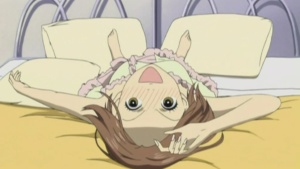
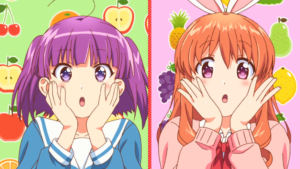 The other way of referring to a show through the title is citing the emotional disposition or atmosphere of the anime/characters within it. Guilty Crown (2011) illustrates Shu’s reluctance to be a leader in the time of crisis, worrying about making people hate him as a result of his commands. The word “koufuku” in Koufuku Graffiti (2015) means “blessedness”, and putting it together with the word “graffiti” gives the connotation that that blessedness gets sprayed everywhere. One of my personal favorites of this case is Kill la Kill (2013-2014), which can also be read as “kiru la kill,” a mix of Japanese, French and English meaning “dressed to kill.”
The other way of referring to a show through the title is citing the emotional disposition or atmosphere of the anime/characters within it. Guilty Crown (2011) illustrates Shu’s reluctance to be a leader in the time of crisis, worrying about making people hate him as a result of his commands. The word “koufuku” in Koufuku Graffiti (2015) means “blessedness”, and putting it together with the word “graffiti” gives the connotation that that blessedness gets sprayed everywhere. One of my personal favorites of this case is Kill la Kill (2013-2014), which can also be read as “kiru la kill,” a mix of Japanese, French and English meaning “dressed to kill.”
Does the Title Have External Meaning?
Sometimes it’s interesting and refreshing for a title to having meaning beyond the show it’s naming. For example, Aria (2005) is more that just the name of a company in the show. The word “aria” is a musical term for a long melody accompanied by a solo voice. Music plays a very important part in the series, both in its very prevalent soundtrack and in its world, because the beauty of Aria just sings.

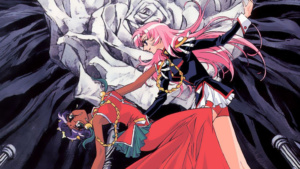
The amazing title Revolutionary Girl Utena (1997) is another one that means more than just Utena setting off a revolution in her world. She is an iconic female heroine and protagonist, defying many tropes and stereotypes of her gender, especially for the time the show came out. In the show, she generally performs the actions and assumes the role of a prince in a typical fairy tale. The character Utena is a revolutionary figure in not just the show, but to anime in general. And it just feels good to say, which brings us to…
Does the Title Have Rhythm?
Perhaps this is a weird way to put it, but titles are like rhetoric in poetry. That said, poetry is about meter and rhythm a lot of the time. The better the name of an anime flows, the easier and more enjoyable it is to say. Shingeki no Kyojin (2012) literally translates to something along the lines of Advance of the Giants or Charging Giants, but Attack on Titan, which means the complete opposite of the original title, just sounds so much better. Unfortunately, there’s really no science for how to come up with a good title, since it’s a “whatever works” case, but there are things to think about when considering what makes a title sound good rolling off the tongue.
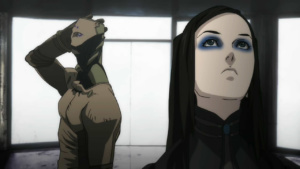
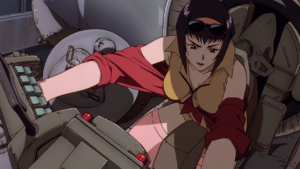
Note that for a title to work, it never has to be grammatically or rhetorically correct according to normal and formal standards. Most of the best titles put together words that aren’t usually ever seen next to each other, like Ergo Proxy or Cowboy Bebop. These names at least are ear-catching because of their unusual tagging of words. God knows what other titles were considered for these shows before settling on an eventual winner, but it’s very apparent that these names were chosen because of the ring they have to them. And that ring most likely comes from their metrical feet.
This isn’t a universal case, but plenty of good sounding titles come from their syllabic structure. For example, Ergo Proxy and Cowboy Bebop are syllabically parallel; each word has two syllables, giving these titles a sense of balance. Both of the words are important, so they take an equal amount of the spotlight. Though I know, in Japan, foreign words still work under the Japanese mora, I’m assuming this since the titles are entirely in English.
The same goes for translated titles like Attack on Titan too; the two words on both ends mirror each other in terms of importance, with a nice bridging short syllable in between. Was this structure deliberate? Most likely not, but it certainly does work for the anime’s sake. At this point, it’s become inherent for us to just know what sounds good and what doesn’t, without having to break it down on a syllabic balancing scale. With the infinite amount of different titles that exist for books, movies, songs and anime, it’s kind of an instinct now.
In the end…
The most important thing that matters is if the title has any creativity or appeal put into it. Of course, what may appeal to some may not do the same for others, since everyone has their own tastes, even when it comes to titles. But the reason why we all love the titles we do is because of what they mean to us. And the title creating process shouldn’t be forgotten about, as it’s just as important as all the other aspects to making an anime.

Featured Sponsor - JAST
The sweetest romance and the darkest corruption, the biggest titles and the indie darlings; for visual novels and eroge, there's nowhere better.
Big thank you to our supporters
From their continous support, we are able to pay our team for their time and hard work on the site.
We have a Thank-You page dedicated to those who help us continue the work that we’ve been doing.
See our thank you page